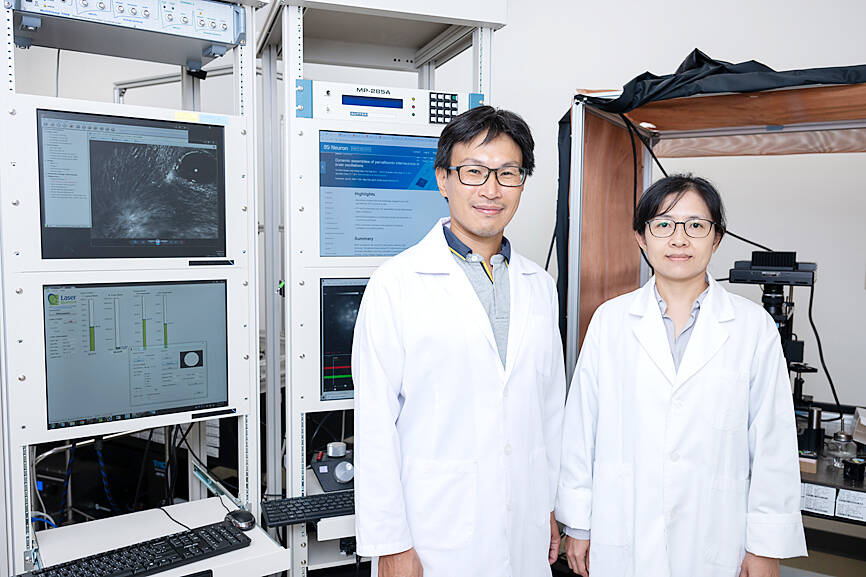A National Yang Ming Chiao Tung University (NYCU) research team has developed a technique to observe the interactions of interneurons in live animals under the microscope.
NYCU Institute of Neuroscience assistant professors Chen Tsai-wen (陳摘文) and Lin Bei-jung (林貝容) led the team, whose research was published this month in the scientific journal Neuron.
“Interneurons are relatively rare nerve cells,” Lin said in a statement. “In the past, scientists could only sporadically observe the transmission of electrical signals from the interneuron cells through implanted electrodes.”

Photo courtesy of National Yang Ming Chiao Tung University
She described the previous research as “finding needles in haystacks,” as scientists could only record one interneuron a month.
There was not a viable way to observe interneurons, she said.
The team developed a technique combining voltage imaging and fluorescent protein technologies, allowing them to record up to 26 interneurons in experiments, she said.
“Our research team found that interneurons do not activate randomly, but tend to do so together to generate action potential to transmit signals, and they seem to be able to find ‘like-minded friends’ to transmit electrical signals together,” Lin said.
Chen said that interneurons are cells that control the transmission of inhibitory nerve conduction in the brain and are closely related to the formation of brain waves.
“Brain waves derive from the potential changes from the synapses of nerve cells. Resonance of a certain number of cells must occur before brain waves can be recorded from the scalp,” he said. “The interesting thing about interneurons is that we can see from a microscope that they tend to find their partners and work together even if they have yet to reach the threshold for action potential.”
The research team used the self-developed technique to directly observe the collective actions of nerve cells of live animals, the university said.
“Their study shows the complicated way cranial nerves work together, which is crucial in understanding how the brain functions,” it said.

Costa Rica sent a group of intelligence officials to Taiwan for a short-term training program, the first time the Central American country has done so since the countries ended official diplomatic relations in 2007, a Costa Rican media outlet reported last week. Five officials from the Costa Rican Directorate of Intelligence and Security last month spent 23 days in Taipei undergoing a series of training sessions focused on national security, La Nacion reported on Friday, quoting unnamed sources. The Costa Rican government has not confirmed the report. The Chinese embassy in Costa Rica protested the news, saying in a statement issued the same

Taiwan is to extend its visa-waiver program for Philippine passport holders for another year, starting on Aug. 1, Minister of Foreign Affairs Lin Chia-lung (林佳龍) said on Friday. Lin made the announcement during a reception in Taipei marking the 127th anniversary of Philippine independence and the 50th anniversary of the establishment of the Manila Economic and Cultural Office (MECO) in Taiwan, the Ministry of Foreign Affairs said. The decision reflected Taiwan’s commitment to deepening exchanges with the Philippines, the statement cited Lin as saying, adding that it was a key partner under the New Southbound Policy launched in 2016. Lin also expressed hope

Temperatures in New Taipei City’s Sindian District (新店) climbed past 37°C yesterday, as the Central Weather Administration (CWA) issued heat alerts for 16 municipalities, warning the public of intense heat expected across Taiwan. The hottest location in Taiwan was in Sindian, where the mercury reached 37.5°C at about 2pm, according to CWA data. Taipei’s Shilin District (士林) recorded a temperature of 37.4°C at noon, Taitung County’s Jinfeng Township (金峰) at 12:50 pm logged a temperature of 37.4°C and Miaoli County’s Toufen Township (頭份) reached 36.7°C at 11:40am, the CWA said. The weather agency yesterday issued a yellow level information notice for Taipei, New

CASE: Prosecutors have requested heavy sentences, citing a lack of remorse and the defendants’ role in ‘undermining the country’s democratic foundations’ Five people affiliated with the Chinese Nationalist Party (KMT), including senior staff from the party’s Taipei branch, were indicted yesterday for allegedly forging thousands of signatures to recall two Democratic Progressive Party (DPP) lawmakers. Those indicted include KMT Taipei chapter director Huang Lu Chin-ru (黃呂錦茹), secretary-general Chu Wen-ching (初文卿) and secretary Yao Fu-wen (姚富文), the Taipei District Prosecutors’ Office said in a news release. Prosecutors said the three were responsible for fabricating 5,211 signature forms — 2,537 related to the recall of DPP Legislator Wu Pei-yi (吳沛憶) and 2,674 for DPP Legislator Rosalia Wu (吳思瑤) — with forged entries accounting for